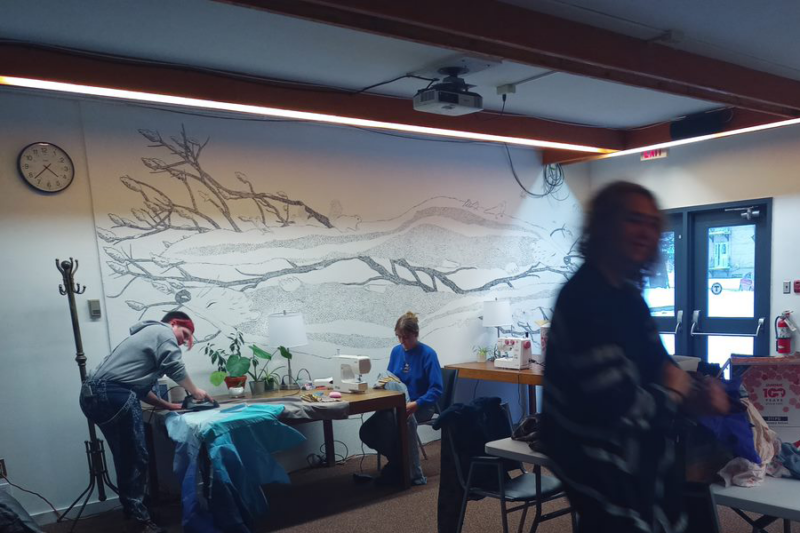Mending Communities
Noelle Ward, Peterborough
Project Description & Goal
Mending Communities is a crafting space where members of the public can access crafting tools such as sewing machines and darning kits and receive support and advice from teachers who have mending skills already.
Mending Communities has a plethora of freely available clothing donated by community members, which people can use as practice or adjust to fit them using the tools available in the space. The goal of this project is to help spread mending skills through the community, reduce clothing waste and improve community members’ ability to express themselves with the clothes they wear.
If I’ve learned one thing from this project, it’s that you can’t do work like this alone. You need people with different skillsets, who can step in when you don’t know what to do next. I’m so excited to see what the next six months bring.
Project Highlights
The first few months of running this program were complicated and moved slower than Noelle had hoped. The Changemaker spent time finding the tools and spare clothing she needed to run her first event, as well as securing an affordable storage space so she didn’t have to store everything in her home.
As these steps went smoothly, Noelle was able to secure free storage at a local non-profit and was able to find enough sewing machines and other materials without too much trouble; and even came in under budget, which was comforting.
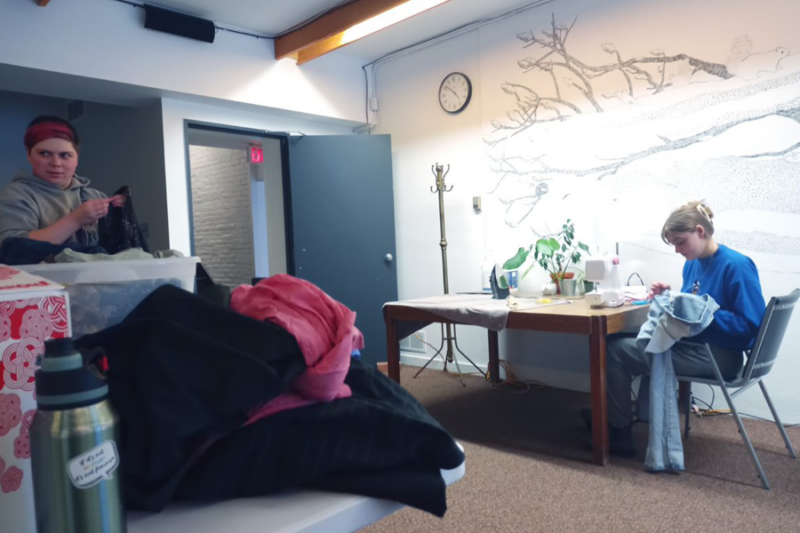
Project Challenges
Finding teachers and other people to help was the next step and presented more difficulties than expected. Only one person was helping her at the time, and she was pretty busy with her job during that period. Noelle reached out to a few other people in the community, but nobody could commit to supporting Mending Communities due to other responsibilities they had. This went on for a few months until early November when a community member reached out. They wanted to do something very similar to what Noelle was planning to do with Mending Communities, and so they decided to work together. In late November, the first Mending Communities event took place, and since then, they have been happening on the last Friday of every month.
What’s Next
“Mending Communities events are currently running monthly, though there are plans to run events more often once we have a few more teachers available. The impact has been small so far, but more people have started to attend as the word got around, and we have signed up to attend some craft shows to spread that word further. It’s been amazing to see a small community begin to form out of a little idea I got in my head only a few months ago and to meet new people through the program. I’m so grateful to the people who attend Mending Communities events, especially those who have stepped up to help keep the project going even when my attention is drawn elsewhere or my energy wanes”, shares Noelle
About Noelle
Noelle Ward is a 28-year-old transgender activist and social service work student. She graduated from Trent University in 2018 with a degree in Psychology and has continued her education in support services through Fleming College. Noelle works with multiple Peterborough-based organizations to help build a community support network among queer and other marginalized people in the city. Outside of activism, Noelle is a tabletop gaming enthusiast and LARPer, the latter of which helped inspire Mending Communities as she learned how many skilled crafters live in her local community.
#socialinclusion
Envisioning an Anti-Racist London
Raghad El Niwairi, London
Project Description & Goals
Envisioning an Anti-Racist London aims to engage and support community building within London, Ontario, especially offering support to the folks who already play a supportive role within their community. Through hosting events and collaborating with other community leaders, the project team hopes to strengthen the support and connection Londoners feel as a whole to their communities.
Project Highlights
Over the past year, Raghad and team hosted events such as a BIPOC Grief and Healing session in which we were able to pay BIPOC Death and Grief Talk to facilitate a much-needed healing session in a time when many racialized communities of Londoners were grieving on the anniversary of the #OurLondonFamily tragedy as well as the anniversary of the discovery of the bodies of Indigenous children at residential school sites and other traumatizing events. The team also hosted a Solidarity Building Community Conversation in which they could have two Black and Indigenous speakers share and facilitate an open conversation on working in fields where advocacy knowledge is necessary and how to navigate these circumstances while being in solidarity with BIPOC and vulnerable people in London.
In the past few months, more specifically, they have been in the process of planning community-based events with the help of other racialized leaders in the city. Specifically, they have held one Strategic Planning Session and were able to provide honorariums for the community leaders who consulted in the planning of events taking place in the coming year.
After receiving funding, we could compensate our collaborators and fund our community-oriented vision. Since this was also a year following our organization’s launch, we were also operating at a level that was much more congruent with our capacity as three individuals, each of whom balanced many responsibilities.
Challenges
Some of the challenges Raghad experienced was an ever-changing outline of the budget and event planning for the year. Despite her and her team being impressive planners and strategists, with every change and opportunity over the past year, they had to adapt and prioritize their planning and funds. This reevaluation was to accommodate for the size of their ideas and ambition and the reality of their personal capacities; the team recognizes that $5000 is still a limited budget in the grand scheme of things.
“Throughout this process, however, our ever-growing hope and excitement were incredibly endearing during every misstep and every change of our plans,” shares the Changemaker, and adds, “in the past, the inaccessibility of funding weighed heavily on our shoulders, especially as we were still attempting to do work way beyond our limits during our first year.”
After receiving funding, the team feels they are no longer over-extending themselves. Using this new method of operating within their capacities, even when their ideas surpassed funding, they were still vibrantly hopeful with the knowledge that they were operating within a healthy amount of work. They were also much more secure in the understanding that even if this budget could not fund all their plans, they had spent a year learning just how much they could accomplish under intense support and with much less support than they now have.
What’s Next
Plans for this year that fit both within the team’s capacity and their budget for this coming year take the form of upcoming Black History Month Reflections, Asian Heritage Month collaborations, Grief and Community Bonding events throughout the spring and summer, and more.
If you’d like to follow their progress over the next six months, check out their website, www.racializedleaders.com and Instagram @racializedleaders!
About Raghad
Raghad El Niwairi is a Black Muslim living in London, Ontario. She is the Co-founder and the Director of Community Care and Consultation for the London School of Racialized Leaders. Raghad received the Ontario Community Changemakers grant on behalf of the Racialized Leaders team in 2022. She grew up watching news broadcasting as a child and was, like many others, moved by the social issues she witnessed on TV. Since then, she has committed most of her childhood and adolescence to hands-on community and advocacy work. This has led to her receiving various volunteer-based awards and to working on projects such as the InterAction Collective.
#SocialInclusion #CivicEngagement
King Street Cooperative Community Garden
Takanya Marsh, Whitby
Project Description & Goals
King Street Cooperative Community Garden aims to create a beautiful permaculture food forest in downtown Whitby, with fruit trees, berry bushes, guild plants, pollinator flowers, and accessible raised beds.
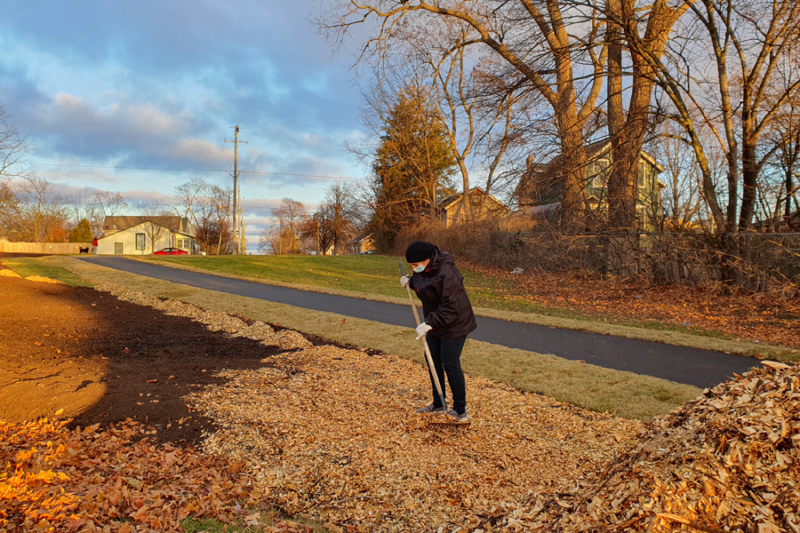
Board member Debbie spreading wood chips at KSCCG
Project Highlights
Last summer, the project team was inspired while attending Durham Integrated Growers’ (DIG) annual garden tour when they visited many community gardens, spoke with seasoned gardeners, and got many ideas.
In the fall, the Town of Whitby installed a wheelchair-accessible path in the park where the King Street Cooperative Community Garden is located. The soil from the path excavation was moved into a berm area for the fruit trees. Takanya and the team spread compost on the berm with heavy support from a board member and her family. The Town then supplied a free source of wood chips to protect the berm. With luck and help from some worms, the prepared soil was ready for planting this spring.
This winter, a resident in the nearby community of Courtice offered a donation of fruit trees. His property, which has a sizable orchard, has been sold for development, and we are currently looking for a landscaping company or arborist to help us rescue some of the trees.
“We visited the orchard, catalogued named varieties, and are currently in the process of researching which varieties can cross-pollinate,” shares Takanya.
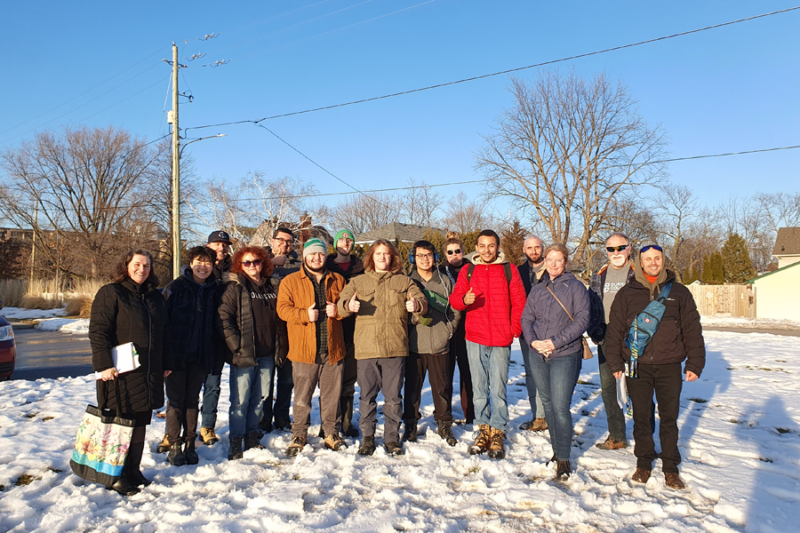
Durham College Site Visit
On the administrative and cultural side, the board of directors agreed that the garden should be an explicitly inclusive space. To this end, the project team wrote their first Diversity, Equity and Inclusion Statement. The statement is a living document which includes an action plan for monitoring and improving the inclusiveness of the Garden over time and prioritizing the needs of marginalized groups. The statement includes a land acknowledgement and a brief Indigenous history of the Durham Region. We intend to make the Garden a space of healing, transformational relationships, and respect for all.
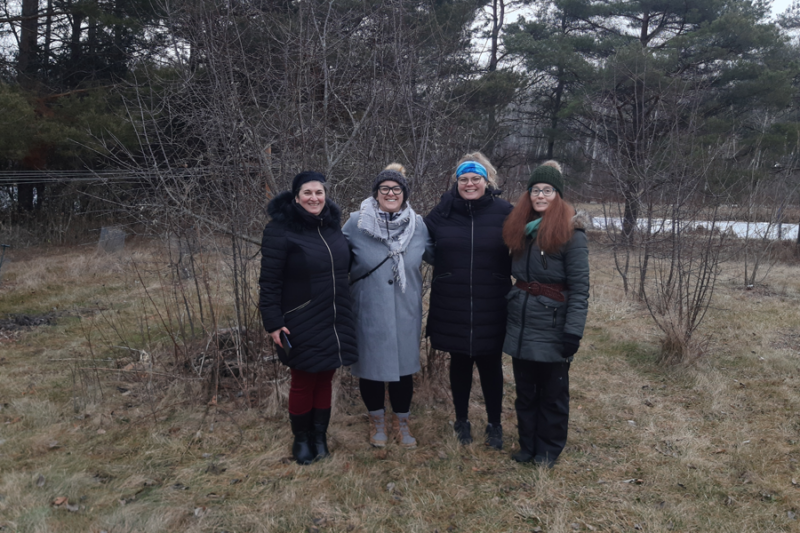
KSCCG ladies at Jay’s Orchard
Another exciting development is the partnership with Durham College. Durham College will help through its Hospitality and Horticulture, and Building Construction Technician programs. This spring, Building Construction Tech students will have a paid work placement building a wheelchair-accessible shed. The Hospitality and Horticulture program has offered to grow plants for the garden’s guilds and vegetable beds. “We went on a tour of Durham College and enjoyed seeing their beautiful greenhouses and carpentry facilities,” says the Changemaker.
What’s Next
This winter, the group purchased grow lights and started growing seeds indoors. They have made a planting calendar and will choose specific varieties of trees that can cross-pollinate in addition to continuing to source trees. With a grant from the Town of Whitby’s Mayor’s Development Fund, awarded to one of the project’s board members, the project will have enough funds to complete the shed and buy plants this spring. The team looks forward to providing updates and is excited to start a community.
For more information about the project:
Contact the team project via email: ksccg.board@gmail.com
Visit them on Instagram (@kingstreetgarden) and Facebook.
If you’d like to support King Street Cooperative Community Garden, click here
#activatepublicspace #civicengagement #socialinclusion
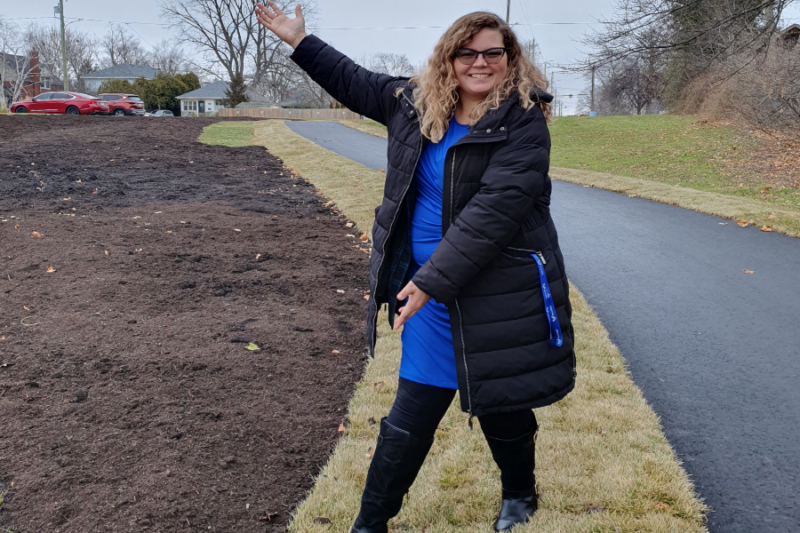
Shelby showing off the new garden and path.
About Takanya
Takanya is a queer, disabled, pagan woman of mixed European descent. Her love of nature led her to study Garden Design at George Brown College and Floral Design at Seneca College, although she is happiest wandering in the forest. The beauty and generosity of flowers, trees and plants has been therapeutic throughout her life, and she hopes to share that healing energy with others. In her volunteer position as lead horticulturalist with the King Street Cooperative Community Garden, Takanya is excited to contribute to local food security and community inclusion initiatives based in collaborative and anti-oppressive frameworks.
